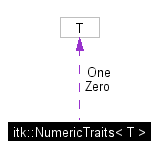
#include <itkNumericTraits.h>
Collaboration diagram for itk::NumericTraits< T >:

Public Types | |
| typedef T | ValueType |
| typedef T | PrintType |
| typedef T | AbsType |
| typedef double | AccumulateType |
Static Public Member Functions | |
| T | NonpositiveMin () |
| bool | IsPositive (T val) |
| bool | IsNonpositive (T val) |
| bool | IsNegative (T val) |
| bool | IsNonnegative (T val) |
Static Public Attributes | |
| const T | Zero |
| const T | One |
NumericTraits is used to extend the traits associated with native types such as float, char, int, and so on. These traits are extensions of the standard <numeric_limits> defined by the C++ compilers. Some of the added traits include minimum and maximum value; accumulation type; etc.
Definition at line 46 of file itkNumericTraits.h.
|
|||||
|
Return value of abs(). Definition at line 55 of file itkNumericTraits.h. |
|
|||||
|
Accumulation of addition and multiplication. Definition at line 58 of file itkNumericTraits.h. |
|
|||||
|
Return the type that can be printed. Definition at line 52 of file itkNumericTraits.h. |
|
|||||
|
Return the type of this native type. Definition at line 49 of file itkNumericTraits.h. |
|
||||||||||
|
Is a given value negative? * Definition at line 76 of file itkNumericTraits.h. References itk::NumericTraits< T >::Zero. |
|
||||||||||
|
Is a given value nonnegative? * Definition at line 79 of file itkNumericTraits.h. References itk::NumericTraits< T >::Zero. |
|
||||||||||
|
Is a given value nonpositive? * Definition at line 73 of file itkNumericTraits.h. References itk::NumericTraits< T >::Zero. |
|
||||||||||
|
Is a given value positive? * Definition at line 70 of file itkNumericTraits.h. References itk::NumericTraits< T >::Zero. |
|
|||||||||
|
Smallest (most nonpositive) value * Definition at line 67 of file itkNumericTraits.h. |
|
|||||
|
Multiplicative identity. Definition at line 64 of file itkNumericTraits.h. |
|
|||||
|
Additive identity. Definition at line 61 of file itkNumericTraits.h. Referenced by itk::NumericTraits< T >::IsNegative(), itk::NumericTraits< T >::IsNonnegative(), itk::NumericTraits< T >::IsNonpositive(), and itk::NumericTraits< T >::IsPositive(). |
 1.3.8 written by Dimitri van Heesch,
© 1997-2000
1.3.8 written by Dimitri van Heesch,
© 1997-2000